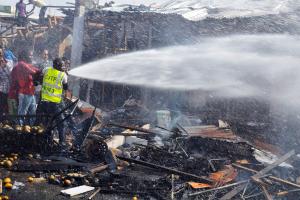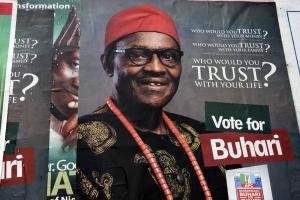President
Goodluck Jonathan, his main opponent Muhammadu Buhari and the 12 other
candidates for the February 14 vote, on Wednesday all vowed to conduct
peaceful campaigns at a UN-sponsored event.
But
as they did so, Boko Haram militants launched a renewed assault in the
restive northeast, where they now control swathes of land, making voting
impossible for hundreds of thousands of people.
On Tuesday, the
Independent National Electoral Commission (INEC) admitted that it was
"unlikely" that elections would go ahead in the rebel-controlled areas
of Yobe, Borno and Adamawa states.The electoral body is scrambling to make arrangements to allow the internally displaced, many of them in camps, to vote outside their home towns and villages.
Political commentator Chris Ngwodo said INEC faced a "logistical nightmare" in organising the vote in a region riven by almost daily attacks and increasingly slipping out of government control.
Nigeria's main opposition All Progressives Congress (APC) has already said the overall result could be invalidated if voters in its northeastern stronghold are disenfranchised.
Lawyer Jiti Ogunye warned of a "very serious constitutional crisis" if elections were not held in Boko Haram-occupied areas, which would put the winners' legitimacy to rule in doubt.
"Under the Nigerian constitution, a candidate must win a majority and 25 percent of votes cast in two-thirds of the country or a state," he told AFP.
"So, if some towns and villages have been taken by Boko Haram, where will the two-thirds come from?"
- Waves of attacks -
Africa's leading economy, most populous nation and leading oil producer has a precedent for election-linked violence, stoking fears of a repeat this time around.
At the 2011 vote, widely considered the cleanest since the return to civilian rule in 1999, nearly 1,000 people were killed in the religiously divided central region.
Former United Nations secretary-general Kofi Annan was in Abuja on Wednesday and called for a peaceful campaign, warning that violence could set back the country and the continent as a whole.
There have already been skirmishes between supporters of Buhari's APC and Jonathan's ruling Peoples Democratic Party, but Boko Haram is posing the greater threat this time round.
Hundreds or more civilians were feared killed in what may prove the worst atrocity in a six-year insurgency that has claimed more than 13,000 lives, after they stormed Baga, on Lake Chad.
The military claims 150 died in the January 3 attack but with the town still in rebel hands, there was no independent confirmation of either figure.
On Wednesday, scores of Boko Haram fighters tried to raid the town of Biu, 200 kilometres (125 miles) south of the Borno state capital, Maiduguri, but were pushed back by the military.
At least 19 people were killed in Maiduguri last weekend, when explosives strapped to a young girl thought to be aged just 10, detonated.
Security analysts believe the upsurge in violence is a further attempt by radical Sunni group to undermine the legitimacy of the government and the election.
The US State Department said on Tuesday it was concerned by the "sharp escalation" in violence but believed the election should still go ahead.
- Close-run vote -
Political analysts say 57-year-old Jonathan, who is looking for a second four-year term, will be run close by former military ruler Buhari, 72, and a second round of voting may even be needed.
An APC victory would dump the PDP out of power for the first time since Nigeria returned to civilian rule in 1999.
Buhari and the APC have lambasted Jonathan for failing to protect Nigerian lives, land and properties in the northeast, as well as his record on corruption and handling of the stalling economy.
Jonathan and the PDP for their part portray Buhari, Nigeria's military ruler from December 1983 to August 1985, as a "dangerous" man of the past with outdated ideas and no national appeal.
No independent polling is available to indicate voting intentions but the APC is seen by some as in front.
"It's going to be very close," said Jideofor Adibe, a political scientist at Nasarawa State University.
"I
think the odds favour the president despite everything because of the
power of incumbency... (But) Jonathan has to find a way to stop the
momentum.
"The momentum right now is with the APC... Whatever he (Jonathan) does, he has to do it quickly."




No comments:
Post a Comment